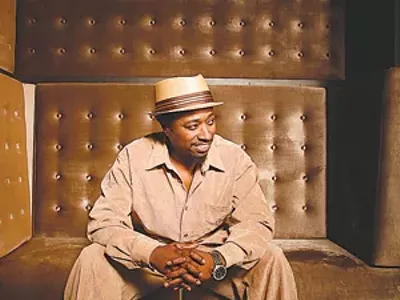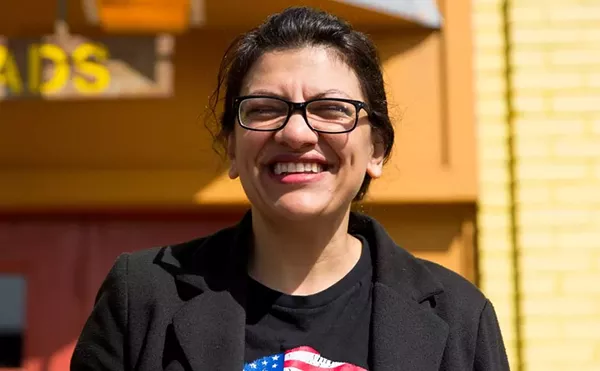I stopped in at the office of Project BAIT the other day. No, I wasn't looking for worms or minnows. BAIT stands for Black Awareness in Technology. At least that's what it stands for today. In 1970, when BAIT's For My People black public affairs television show first aired on Channel 50, it stood for Black Awareness in Television. Apparently the BAIT folks have evolved with the times.
In its 40th year, just to be still standing is quite an accomplishment for the loose-knit organization that started up during the black-power era. For My People began as a response to protests over Channel 50's airing of old Little Rascals episodes and reviving Buckwheat, the drawling, nappy-haired child character who was considered a negative black stereotype. A public service program, For My People still airs on WKBD Channel 50 at 6:30 a.m. on Saturdays, daily on Comcast Detroit's Channel 68, and on cable systems in Indiana, Illinois, Ohio and Ontario, in addition to Internet access through Google video and YouTube.
But Executive Director David Rambeau doesn't have much interest in looking back, even though BAIT has had a hand in educating dozens of television production technicians who work across the United States. The media veteran is excited about international initiatives made possible through modern technology, especially the Internet. "We don't take a Detroit orientation," he says. "Detroit is where we're located but our piece is worldwide; it always has been."
Not that they've been ignoring things on the home front. Their pages on YouTube include interviews with local politicians and activists, and a piece on Detroit police violence.
"We were out in front on the City Council and on the mayor [Kilpatrick]," says Ron Scott, a BAIT on-air host and local political consultant and activist. "We're not afraid of anything, no sacred cows. Even though we are African-centered, we've raised questions about our own community."
Scott wasn't at the office when I visited, but I spoke to him later. While the local issues have been easier to get at, he acknowledges the importance of the international connections, such as video sharing with people in Brazil, South Africa and Namibia. While local papers have closed or consolidated bureaus in Africa, Eastern Europe and Washington, D.C., and cut back newsrooms, BAIT has stepped up on a shoestring budget. "Even as news and public affairs programs are going local, we're going global, or glocal," says Scott.
Global is local in today's world. And while the group works mostly at a street level, high concepts underpin their philosophy — Frantz Fanon, the psychiatrist-philosopher from Martinique, African-American activist W.E.B Du Bois and German philosopher Hannah Arendt come up in the course of conversation. The sense of globalism inside the small, cluttered production office is palpable. Mark Wells, an on-air host, is at the forefront of their Brazil initiative. He speaks Portuguese, his wife is Brazilian and he has visited the country numerous times. Wells was busy working on a report while I was there, but Rambeau talked about their AAAB (Afro-American, Afro-Brazilian) project.
"There are 40 million blacks in the United States and 90 million in Brazil," he says. "That's 130 million who have undergone similar historical experiences in the diaspora as far as slavery and the mixed-mulatto experience. Through technology we can deal with each other on a peer-to-peer basis and end this minority thinking — the psychology of less-than in relationship to the group that is more-than."
Rambeau foresees a 20-year effort that starts with communication. Teaching each other our languages and learning about the day-to-day experiences to build up a single consciousness between the groups, a global perspective. It certainly makes sense as we now live in an international marketplace. If you don't believe that, ask any unemployed autoworker in your neighborhood. Corporations have globalized the economy, but they didn't globalize human rights, workers' rights or environmental justice.
While we talked, Eddie Morisseau, a Haitian immigrant who lives in Detroit, came in. His arrival prompts a discussion on the situation in Haiti following the devastating earthquake there. Morisseau wants to go there to work as an interpreter in the relief effort.
"I'm trying to find a way in," he says.
Commercial flights into Haiti are shut down, so it will take some ingenuity. Morisseau gets a phone call from a friend who somehow got aboard the hospital ship Comfort headed for Haiti. With 200 operating rooms, Comfort is the biggest hospital anywhere it docks. The news brings a bit of joy into the room. A few minutes later, Morisseau mentions that if he sneaks into Haiti he may have a problem getting back into the United States.
In the long run, Morisseau is the connection the folks at BAIT expect to use to get firsthand reports on what's happening on the ground in Haiti once the immediate emergency abates and the international media leaves. Their focus is on the long term.
"Diligence is more important than intelligence," says Rambeau. That may be, but there seems to be a lot of intelligence packed into the crowded office inside the Considine Recreation Center on Woodward Avenue in Detroit. Further, it seems that diligence can beat the lack of financial resources. Rambeau declines to talk about their finances, but it's obvious from the plywood door on their cramped quarters that there's not a lot of finances to talk about. Scott does go so far as to say they get donations from individuals and they are getting into selling T-shirts and other articles sporting the BAIT logo.
Wherever the money comes from, they need it. A few weeks ago their office was burglarized. The saving grace was that some of their equipment was inside a double-locked closet and didn't get taken.
"We've been hit twice," says Wells, who seems undaunted by the events. "The hood is the hood wherever you go."
After 40 years it'll take more than a few petty criminals to throw them off their game. This is no bait-and-switch operation.
No tai chi: I took my daughter and a friend ice skating at Campus Martius recently. After watching the girls skate for a bit I decided to practice tai chi while I waited. I found an open area away from where most people were walking and started in the 108 basic forms of the meditative martial art. Shortly thereafter security guards approached me on two sides. They didn't want me doing it there, saying that I might "make people uncomfortable" with my gestures. Obviously they have been instructed to keep street people away from the ice skaters and they took me for one. I guess I was my unkempt hair and layered clothing look. Then they tried to get me to leave. When I pointed out I was with the girls (paying customers) the guard went over and asked them if I was really with them. When I told folks at my tai chi class about the incident, they thought we should go downtown as a group and practice. So if you see a group of people at Campus Martius moving really, really slow. Don't be alarmed, it's tai chi.







